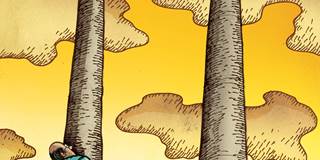The Perils of 2012
The pragmatic commitment to growth that one sees in Asia and other emerging markets today stands in contrast to the West’s misguided policies, which, driven by ideology and vested interests, almost seem to reflect a commitment not to grow. As a result, global economic rebalancing is likely to accelerate, almost inevitably giving rise to political tensions.
KOLKATA – The year 2011 will be remembered as the time when many ever-optimistic Americans began to give up hope. President John F. Kennedy once said that a rising tide lifts all boats. But now, in the receding tide, Americans are beginning to see not only that those with taller masts had been lifted far higher, but also that many of the smaller boats had been dashed to pieces in their wake.
In that brief moment when the rising tide was indeed rising, millions of people believed that they might have a fair chance of realizing the “American Dream.” Now those dreams, too, are receding. By 2011, the savings of those who had lost their jobs in 2008 or 2009 had been spent. Unemployment checks had run out. Headlines announcing new hiring – still not enough to keep pace with the number of those who would normally have entered the labor force – meant little to the 50 year olds with little hope of ever holding a job again.
Indeed, middle-aged people who thought that they would be unemployed for a few months have now realized that they were, in fact, forcibly retired. Young people who graduated from college with tens of thousands of dollars of education debt cannot find any jobs at all. People who moved in with friends and relatives have become homeless. Houses bought during the property boom are still on the market or have been sold at a loss. More than seven million American families have lost their homes.



KOLKATA – The year 2011 will be remembered as the time when many ever-optimistic Americans began to give up hope. President John F. Kennedy once said that a rising tide lifts all boats. But now, in the receding tide, Americans are beginning to see not only that those with taller masts had been lifted far higher, but also that many of the smaller boats had been dashed to pieces in their wake.
In that brief moment when the rising tide was indeed rising, millions of people believed that they might have a fair chance of realizing the “American Dream.” Now those dreams, too, are receding. By 2011, the savings of those who had lost their jobs in 2008 or 2009 had been spent. Unemployment checks had run out. Headlines announcing new hiring – still not enough to keep pace with the number of those who would normally have entered the labor force – meant little to the 50 year olds with little hope of ever holding a job again.
Indeed, middle-aged people who thought that they would be unemployed for a few months have now realized that they were, in fact, forcibly retired. Young people who graduated from college with tens of thousands of dollars of education debt cannot find any jobs at all. People who moved in with friends and relatives have become homeless. Houses bought during the property boom are still on the market or have been sold at a loss. More than seven million American families have lost their homes.